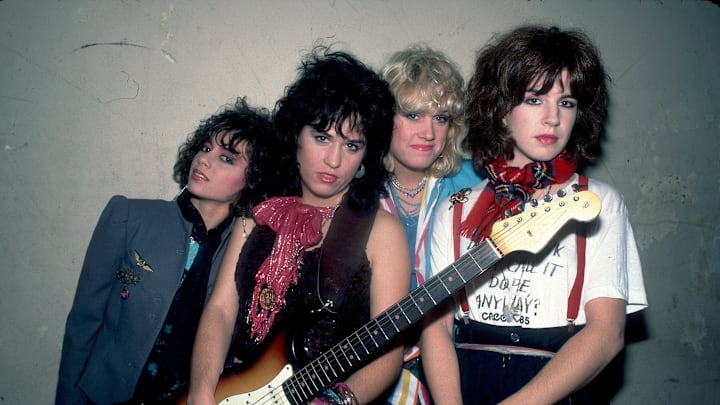Radio stations have censored or banned records for almost as long as they have been playing them. (Billie Holliday’s 1939 song “Strange Fruit,” which helped to inspire the civil rights movement, was banned by many Southern stations.) But since the coming of rock’n’roll in the 1950s, famous pop songs have been banned from airplay, or even removed from records, for a number of unusual reasons. Here are some of the most intriguing.
- “Wake Up Little Susie” // 1957
- “Splish Splash” // 1958
- “Tell Laura I Love Her’ // 1960
- “Puff the Magic Dragon” // 1962
- “My Generation” // 1965
- “Let’s Spend the Night Together” // 1967
- “A Day in the Life” // 1967
- “Lola” // 1970
- “God Save the Queen” // 1977
- “Walk Like an Egyptian” // 1986
- “Cop Killer” // 1992
“Wake Up Little Susie” // 1957
Reason: Teenage hanky-panky
Despite their wholesome image, the Everly Brothers made the news when this hit song was banned by radio stations because it was all about a pair of teenagers sleeping together. In this case, the emphasis really was on sleeping.
“Splish Splash” // 1958
Reason: Nudity
Bobby Darin’s ditty is about a guy who walks out of a bath and into a party in the adjoining room. It was banned for an excellent reason: There was no mention of him putting his clothes back on. In fact, it mentions that he just places his towel around him. Shocking!
“Tell Laura I Love Her’ // 1960
Reason: Too sad
Laura and Tommy were lovers, Ray Peterson’s ballad begins ... but (spoiler alert!) things go down downhill at a stock car race and Laura ends up alone. Perhaps radio station censors didn't want to encourage any teenage couples to take part in reckless driving.
“Puff the Magic Dragon” // 1962
Reason: Alleged drug references
In 1970, Vice President Spiro Agnew described rock music as “blatant drug culture propaganda” and warned that it threatened “to sap our national strength unless we move hard and fast to bring it under control.” He immediately went on a crusade to ban songs that referred to drugs. This included Peter, Paul, and Mary’s child-friendly ditty “Puff the Magic Dragon,” which allegedly referred to drug use and/or acid trips. Songwriter Peter Yarrow always said it was merely an innocent fantasy with no hidden meaning.
“My Generation” // 1965
Reason: Potentially offensive to people who stutter
It wasn’t because Pete Townshend repeatedly destroyed his guitars after playing ”My Generation,” or because the anthem proclaimed a new aesthetic at odds with post-war values. No, the BBC banned the Who’s hit because singer Roger Daltrey purposefully stuttered the lyrics, which had the potential to offend those with the speech disorder.
“Let’s Spend the Night Together” // 1967
Reason: Lyrics too sexy for Ed Sullivan
The Rolling Stones were asked not to perform this song on The Ed Sullivan Show. Ever the rebels, they refused, but they worked out a compromise, agreeing to change the lyrics to the less suggestive “let’s spend some time together.” On the live show, Mick Jagger sang “let's spend some mmmm together” and rolled his eyes heavenward. To the more optimistic viewers, he was singing “time” and just mumbling. Sullivan still banned them from ever appearing on the show again.
“A Day in the Life” // 1967
Reason: Drug reference
Often voted by musicians and critics as the best Beatles song ever, this final number from Sergeant Pepper's Lonely Hearts Club Band has a few sections. Though it has some bizarre, drug-inspired verses written by John Lennon, whose lyrics (“Now they know how many holes it takes to fill the Albert Hall”) don’t always make sense, it was the more straightforward lyrics of Paul McCartney's section that got the song banned by BBC Radio, specifically the line “found my way upstairs and had a smoke.” This was considered an unmitigated drug reference. Still, while McCartney was certainly known to enjoy the odd joint back then, you could argue that he was possibly just talking about tobacco.
“Lola” // 1970
Reason: Free advertising
The Kinks classic couldn't be played on the BBC for a legal reason: the lyrics “where you drink champagne and it tastes just like Coca-Cola.” To solve this problem, Ray Davies, the lead singer and songwriter, was flown from the U.S. to Britain to re-record this one line, as the government-run station could not be seen to endorse any product. According to the revised song, the champagne in North Soho tasted like cherry cola.
“God Save the Queen” // 1977
Reason: Unfair to Her Majesty
The Sex Pistols classic made No. 1 on the British charts despite being banned from radio for insulting Her Majesty during her Silver Jubilee celebrations.
“Walk Like an Egyptian” // 1986
Reason: Insensitive to Egyptians
The BBC banned the Bangles’s chart-topper in 1991 following during the Persian Gulf War, and media network Clear Channel nixed it from its radio stations following the 9/11 attacks—both times to avoid inflaming tensions with the Middle East.
“Cop Killer” // 1992
Reason: Los Angeles riots
After riots broke out in Los Angeles following the Rodney King beating, a Texas police officer called for a ban on Ice-T and Body Count’s hardcore song. The riots had been inspired not by the music, but by the acquittal of white LAPD officers after they had been captured on video assaulting King. Ice-T continued to defend the song, saying that it had a strong sense of justice. As a statement about vigilantism and revenge against corrupt law enforcement, he suggested that it was similar to Clint Eastwood's western movie Unforgiven.
Read More Stories from Music History:
A version of this story was published in 2011; it has been updated for 2025.
